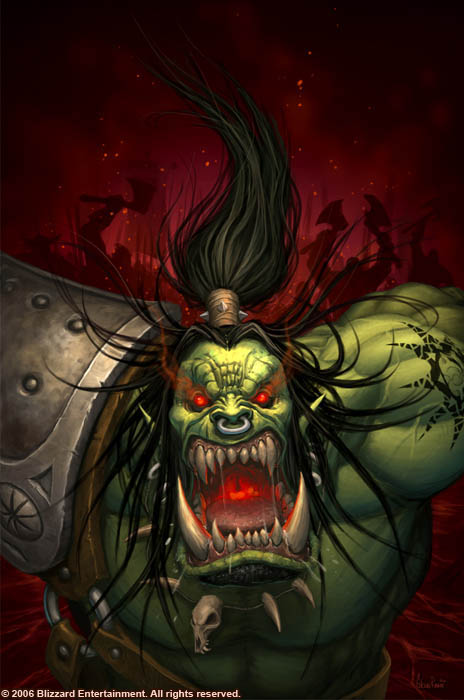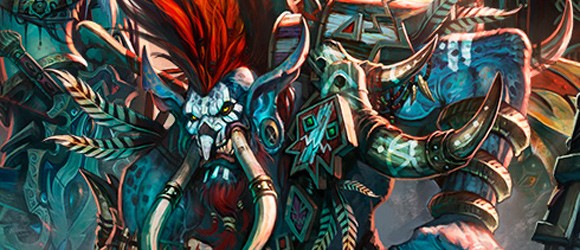Last updated on August 8, 2013
Garrosh Hellscream bears the name of his father, Grom Hellscream. Grom, for his part, isn’t know for anything particularly heroic or praiseworthy. If anything, we know Grom in WoW lore as one of the first to taint the Orcs with demonic corruption. Demons from the Burning Legion had, through insidious methods, turned the Orcs from tribal warriors who lived simple lives into a fighting machine designed to kill the Burning Legion’s enemies. Their skin turned from brown to green; their power increased, as did their blood-lust. The Orcs literally destroyed their home world through their constant need for death and conquest after drinking the literal blood of demons. They turned their home planet, Draenor, into a rotting husk of a world, and in their fervor built a portal to another dimension (hence, the events of WarCraft). Yes, Orcs are literally aliens in the storyline of WarCraft.
Back to Grom: Grom ruled the Warsong Clan, already known for their penchant for battle and conquest. Still, what Grom did – that many villains did not do – is drink that blood willingly. He desired power to conquer, and gain power willingly. He didn’t take back his decision; he fought to the end. Although he redeemed himself later, his redemption comes at the price of his own death as he willingly slays the very demon who corrupted the orcs in the first place.

Now, imagine: that is a very tall legacy to imagine for a child. Garrosh is that child. We originally meet him in Outland (i.e., destroyed Draenor), where he appears afraid that he will end up just like his father and send the orcs, still native to Draenor, to their destruction. This leads him to inaction and fear. It takes the current Warchief at the time, Thrall, to give him the confidence necessary to strike out and fulfill his family’s legacy without the taint of corruption.
Unfortunately for Garrosh, he learns exactly the wrong lessons. Thrall gives him too much power too quickly; he acts rashly and unwisely, in the process alienating many current and possible allies to himself. During Wrath of the Lich King, Garrosh found himself in charge of an entire army, and he led this very effectively. As a diplomat, however, and one willing to listen to the opinions of others, Garrosh fails. Garrosh knows only war, and everything remains an either/or issue: you are either against him, or for him. That doesn’t mean he does not have a code of honor, or that he has not, since becoming Warchief, tried to do what he thought best for his people, but the leader of a nation of diverse people cannot enforce one option to the population without recourse.
Garrosh, ultimately, fails at being a Warchief. He returns to the old ways of Grom, even without realizing his own lust for war and conflict at the expense of an entirely new world. And, when the option for new power presents itself (in this case, the Sha of Pride), Garrosh takes it willingly. Or, at least we suspect so given the data people unearthed in this new patch. It is key to note that this corruption is entirely willing and cloaked in the guise of “The True Horde”, yet he’s nothing of the sort. The Horde evolved over time to include other races, but Garrosh ignores this fact. He commits brutal war crimes, tries to use the Sha as a weapon, and his actions continue until Vol’jin steps in to take him down. It’s no wonder both factions unite to take down this heinous leader.

And you might find this a series of obvious story “tropes”, to which I say: well, they work. We all relate to this idea, especially thinking of our own political leaders as incompetent nitwits at times. But we rarely think of ourselves in this light. Managing our own lives, we think we got it down pat; we’re OK, at least in comparison to other people. It doesn’t matter that Matthew 7 says otherwise, because we know better:
7 “Do not judge so that you will not be judged. 2 For in the way you judge, you will be judged; and by your standard of measure, it will be measured to you. 3 Why do you look at the speck that is in your brother’s eye, but do not notice the log that is in your own eye? 4 Or how can you say to your brother, ‘Let me take the speck out of your eye,’ and behold, the log is in your own eye? 5 You hypocrite, first take the log out of your own eye, and then you will see clearly to take the speck out of your brother’s eye.
Honestly, at a point I do not think this judging occurs on a conscious level. We constantly compare ourselves to some external standard (not without warrant, as God sets them), but we keep choosing the wrong standards. We make an objective, yet arbitrary, one based on our own notions of what will make us do the least work. But, in any event, all of these contain an element of pathological thinking: we refuse to change, and so our behavior goes along with it.
Partly, this comes from our Western cultural notions of human personality. In ordinary life, we communicate with others and operate in relationships under the facade of “personality”. We present ourselves to the world in general and even to God in a particular way. We must remain consistent along these lines, or people think you’re weird, and who’s to blame them? They also operate under the same paradigm, and would rather not have a long-time friend probe into their circumstances.
Again do we rest on the Cartesian notion that we’re a thinking thing, a unique thinking thing that just happens to attach itself to a body, but the Bible does not use that language. Paul frequently uses the Greek word sarx, frequently translated as body, to refer to the holistic human framework. There’s a relation between what we think and what we do, and Paul does not think otherwise. It is we, in our culture, who think that it goes that way because of that Cartesian dualism, but Christianity understands that this is not the case; everything affects everything else, and we see one in exclusion to the other. Our culture teaches us this.
Yet that’s not our true identity, not by a long shot. You think about things all the time, imagine things all the time, yet put up the facade you’d rather see in public. You act as you’re expected, depending on your context. I find this is what makes Garrosh so interesting – his Pride, in effect, makes him act as expected. He rules the Horde, an originally “orc exclusive” organization, and he follows in the footsteps of his father almost to the letter. He does what people expect: to create the True Horde freed from lesser beings and corruptions. Still, he will not deviate from this course until he’s beaten or dead (more than likely the latter). His moves appear calculated to achieve that end of becoming a true “Warchief”, yet he probably finds himself more divided within than you would suspect. Contrast this to the figures of Illidan and Arthas I mentioned earlier, and you will see he’s a much more interesting villain.
Because, really, you could be him right now and just not know it. A political leader makes this known much more openly (note the string of scandals by the current administration), but our personal consequences do not come to light in such an obvious way. It’s mot by lack of trying to figure out why the way you think remains inconsistent with how you act, or why a believing Christian continues to find himself with the same hangups and trials they experienced beforehand. Most relate this to the lack of a true conversion experience, but Pride manifests itself in many way, and a fallen nature makes it more difficult to root out.
In any case, we’re still afraid to speak our mind; like a patient in psychoanalysis, we do everything in our power to avoid it, conscious and unconscious. To look at the mirror and see ourselves as we really are, and not what we imagine ourselves to be, remains more terrifying for many people than death. The idols of our mind hide in the shadows, making them hard to identify. Plus, we actively seek to NOT find them, as it may make us appear incoherent, confusing, crazed. We’d rather keep to ourselves and our mimicked image of ourselves, rather than see what’s really there. The idols hide well:
4 Their idols are silver and gold,
The work of man’s hands.
5 They have mouths, but they cannot speak;
They have eyes, but they cannot see;
6 They have ears, but they cannot hear;
They have noses, but they cannot smell;
7 They have hands, but they cannot feel;
They have feet, but they cannot walk;
They cannot make a sound with their throat.
8 Those who make them will become like them,
Everyone who trusts in them.Psalm 115
We trust in falsities; God deals in realities. Garrosh takes the identity of another to avoid his own, and in the process becomes a monster.
